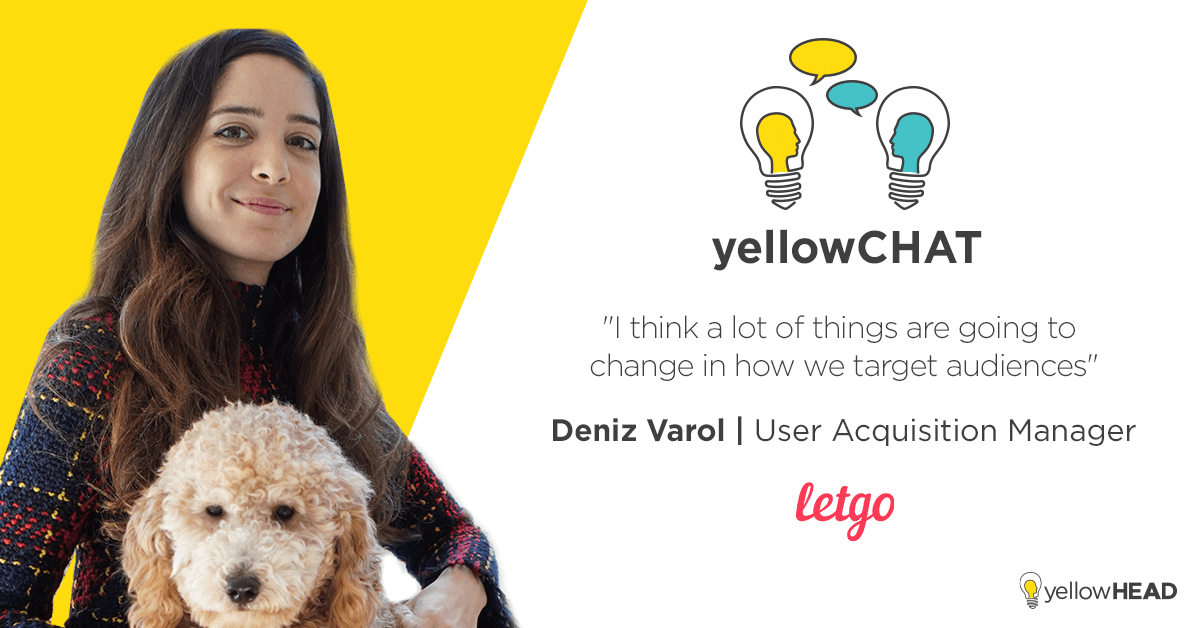Adapting to User Acquisition Trends & Capoeira Moves, Deniz Varol is letgo’s Marketing Chameleon
For Deniz Varol, business has always been an interest. She took business class as an elective in high school, where she learned about marketing. It was at that point that she thought, “you can add value to a product/service just by marketing it in a creative way? That’s really cool!” (I’m sure that wasn’t what she thought word for word, but it was probably something along those lines).
Because of this one thought, she took marketing classes in college, while she was studying business organizations of society. After some time in these classes, it dawned on her that she was really into the data and computer side of things. It was the optimization part she liked – the ability to spend money, see results, look at the data, and make changes almost instantly.
So, after college, Deniz began looking for jobs in the field. She interviewed at many different companies until she found herself an internship.
The internship turned into a full-time gig in the SEO department, which led to paid marketing, to Search Engine Marketing. She learned all aspects of web marketing and lead generation.
It was time for her to move onto her next challenge – mobile marketing for an app.
Deniz strongly believes in doing something that has a positive impact on people’s lives. She is now the User Acquisition Manager at letgo, a local buying and selling marketplace for users who want to sell items or buy secondhand.
There, she is responsible for growing their new user base both in paid and organic channels, as well as re-engaging with current users to increase their in-app activity.
“By working at letgo,” Deniz says, “I feel motivated every day that I’m helping people get rid of their clutter, live a better life, and help the environment by reusing stuff instead of buying brand new products.”
What are the main components of your marketing mix? What channels are you utilizing?
We utilize the main channels, such as Google, Facebook, Apple Search Ads, ASO, and some programmatic partners. It’s important to keep a balance between these channels and not put all your eggs in one basket. On top of the main channels, we evaluate and test new partners and channels like influencer marketing.
Google, Facebook, Apple search ads, ASO.
From each channel, we get a bit of a different type of user. For example, on search platforms, people have high intention to sell products.
When we look at data from ad groups and the in-app actions that people take after downloading letgo, we see that, because they have the intention to sell, there are more listers coming from those campaigns.
On the other hand, social media platforms are a prime spot to grab someone’s attention with shiny, nice pictures of products and good prices. That basically attracts more buyers, because they say, “Oh my god, I get to buy this product for so much cheaper as secondhand.” So they go and start conversations with sellers instead of buying right away.
We do see seller and buyer percentage differences coming from different channels.
At the same time, a person can be a buyer and seller. Even if we brought a buyer into the marketplace, we know that, at some point, that user could become a seller. So it’s very dynamic. But the ads, the intention of the user, and how we drive that user into the marketplace does change the in-app activities that people take in the beginning.
How does ASO fit into there then?
When we look at users acquired organically, I think ASO has definitely given us great performance. Users are actually searching for related services on the app stores, and they download letgo by making a decision that this is an app they need. Organic installs have a higher intention to use the app, and we see pretty good seller percentages coming from there.
Generating sellers is very important in the marketplace, because without having products, you can’t really have buyers. You also have to create a balance with buyers, because if you posted something but you don’t get any messages from anyone in the first week, you’re never going to use letgo again. So we need to have enough people who are interested in buying and enough people selling.
However, ASO can be difficult to measure incremental things that we’re bringing in. And because we can’t measure that, we can’t say, “OK, because I added this keyword into my listing, we’re getting this many new sellers right now.”
What are some things that surprised you along the way in your marketing techniques?
We are using Facebook’s Dynamic Product Ads to build more personalized and targeted campaigns. While building the DPA campaigns, I worked closely with our tech and BI teams to ensure that we send an updated product feed and re-engage with users who would be interested in those products. After running an uplift test on these campaigns, we saw that they were generating incremental conversions drastically in a more efficient way than other campaigns. This wasn’t extremely surprising to me, since this is a more personalized re-engagement campaign, but it was really cool to see the results.
How do you decide which new markets to target? What strategies do you implore when entering those markets?
letgo is a very popular app in Turkey for second hand buying and selling. Before testing new markets, we do extensive research on the market, how people buy and sell, if there are any direct competitors, and many more factors. After testing in a bunch of countries, letgo was successfully adapted in Turkey due to the high smartphone penetration rate and low competition.
What’s something about yourself that doesn’t tend to come up in professional circles? [hobbies?]
Other than being a professional dog sitter? I don’t really like going to the gym, but I discovered that my passion for fitness is martial arts. I’ve been taking Krav Maga and Capoeira classes since last year and I love it! It’s not only a great workout but also a great way to learn how to protect yourself.
Actually, in Capoeira, you get a nickname when the trainer gets to know you better. So, after a couple of weeks, mine gave me the nickname of Chameleon or Camaleão in Portuguese.
Apparently, he sees that I adapt very quickly. He just needed to show me what move I have to make once or twice, and then I’d adapt to it. He therefore thinks I’m like a chameleon, changing colors wherever I go.
Where do you see the industry headed over the next 5 years? Do you have any predictions?
With the new regulations in data privacy, I think a lot of things are going to change in how we target audiences and report on our marketing campaigns. While I’m a data-oriented marketer, I am also a user of many apps and websites.
I believe these regulations are going to change the way we do marketing for the better. It might be frustrating as a marketer to not be able to do detailed targeting or reporting as we used to, but it’s liberating as a user to know that companies who might use personal data for the wrong reasons will be held to higher standards.
I think things change and we just need to adapt. It’s for the better.
What is your golden tip?
Always question the data and be curious! I believe a good marketer is data-oriented and curious. Don’t just take a report and believe in the numbers without questioning. I’ve discovered and learned so many things just by digging deeper into the data and questioning its validity.


